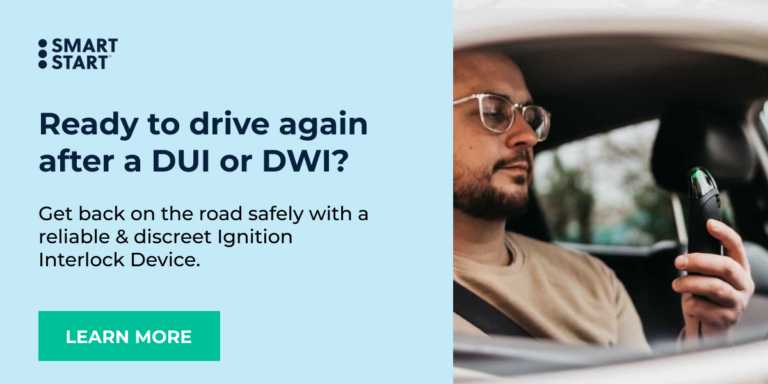Florida Ignition Interlock Violations: Staying on the Right Side of the Law
Updated July 17, 2025
If you’re convicted of Driving Under the Influence (DUI) in Florida, the courts can order you to install an Ignition Interlock Device (IID) on your vehicle. These devices test a driver’s Blood Alcohol Level (BAL) before the driver can start their engine, as well as at periodic intervals while driving (called a rolling retest).
Drivers who have to use IIDs are subject to certain rules, such as completing rolling retests and getting their IID serviced regularly. Breaking these rules is known as a violation, and can result in penalties from your monitoring authority. Thus, if you’re required to use an IID, knowing and following the Florida Interlock rules is essential for staying in compliance — so take a minute to look at this guide to common violations and penalties.
Note: Florida law uses the term Blood Alcohol Level (BAL) where most states use Blood Alcohol Content (BAC). These terms mean the same thing.
What Is an IID Violation in Florida?
An IID violation is a specific type of prohibited action involving an Interlock Device. There are a variety of different types of violations that a driver can commit with an IID. Some of the most common violations include:
- Alcohol level violations
- Missed service appointments
- Attempting to remove or otherwise tampering with the device
- Failure to provide a sample when required (including rolling retests)
When one of these violations happens, the device automatically collects information about what happened and submits it to the service provider.
In turn, the provider will submit that reading to the Florida Department of Transportation (FDOT). After reviewing the event, the FDOT will either:
- Recognize it as an error and remove it from the driver’s record, or
- Determine that it’s accurate and take disciplinary action
We’ll cover penalties near the end of this article. First, let’s look at some of the most common violations and how the state of Florida defines them.
Alcohol Level Violations
In Florida, the legal BAL limit for driving is under .08. For IID users, however, this concentration needs to be even lower before they can turn on their engines. If the user gives a sample with a BAL above the IID limit, the vehicle will not start.
Per the Florida Department of Highway Safety and Motor Vehicles (FLHSMV), .025 is the current IID threshold limit. However, judges also have the authority to order a lower threshold.
Providing two samples in a row that are over the limit when trying to start a vehicle is considered a violation. Sometimes, this might happen if you’ve eaten certain foods or used mouthwash before providing a sample. (Read about how this can happen.) If you haven’t been drinking alcohol, wash your mouth out with water, wait a few minutes, and give a new sample. If you have been drinking, you’ll need to wait until the alcohol has left your system.
The user may also be required to give a sample after the vehicle has started (called a rolling retest). Providing a rolling retest sample while over the limit is also considered a violation. Your vehicle will not shut off while driving, but you may be prevented from starting it again.
Missed Service Appointments
Florida law requires IIDs to be calibrated and serviced monthly to ensure they’re in good working order and providing accurate readings. Once a month, you’ll need to take your IID-equipped vehicle to a registered service center that works with your Florida Ignition Interlock provider, or an approved out-of-state service center.
If you fail to bring your vehicle in for the required service and calibration, your IID may enter “service lockout” mode. This means you will be unable to start the vehicle at all and will need to have your vehicle towed to your IID service center.
Smart Start IIDs provide a “grace period” in which you’ll see a countdown to lockout mode on your device, and you may be able to receive a one-time unlock code even after your device has entered lockout. These features help you avoid towing your car, but you’ll need to report to a service center within the specified time frame to have the IID calibrated.
Tampering With Your Device
Attempting to tamper with your IID in any way will almost always trigger a violation. This includes attempting to remove the device yourself or using any methods to “trick” or circumvent it. In addition, because your IID connects to your vehicle’s electrical system, trying to remove or tamper with it can damage your vehicle.
If you want to have your device removed before your required IID period is over, you can request a removal at your IID service center. However, be aware that you will typically be required to surrender your license before your IID can be removed, and you may not receive credit from the state for the time you’ve had your IID installed.
Failure to Provide a Sample
Another common violation is failing to provide a rolling retest sample when your IID prompts you to. A rolling retest can happen at any time after you start the vehicle. When your device notifies you to provide a retest, you’ll be required to provide it within the specified time window, usually several minutes.
You don’t have to give the sample while you’re driving, and in fact, Smart Start recommends pulling over to use your IID. As noted earlier, the IID will not shut the engine off while you are driving the vehicle, no matter what. However, if you don’t provide a sample within the required time frame, you may receive a violation.
Consequences of IID Violations in Florida
If you receive an IID violation in Florida, FLHSMV will typically send you a letter detailing your violation and the consequences. These consequences vary, but can include:
- An appointment with your monitoring authority and paying an administrative fee.
- An extended appointment to create a case management plan.
- Entering a substance abuse treatment program.
- An extension of the time period in which you’re required to drive with an IID.
- Potential criminal charges under Florida Statute 316.1937 for certain violations, such as attempting to remove your IID without permission.
After a violation, your IID may enter “violation lockout” mode. Much like service lockout mode, this will require you to have your vehicle towed. Smart Start IIDs may also offer a grace period for violation lockouts, but as before, you’ll need to get your vehicle to a service center before the grace period ends.
How many Interlock violations can you have in Florida?
In most cases, there are no “freebie” Interlock Device violations in Florida. Even your first violation will typically require a conference with your monitoring authority. The more violations you have, the more serious the consequences. As listed by FLHSMV:
- For a first violation, the fee is $25, and you’ll usually be required to attend a conference.
- For a second violation, the fee is $55, and you may be required to attend monthly follow-up appointments at a cost of $45 each.
- For a third or subsequent violation, the fee is $60, with monthly follow-up appointments at a cost of $45 each. You may also be referred to enter a substance abuse treatment plan.
Since drivers who get a DUI are already responsible for the cost of their own Ignition Interlock, these fees can add up quickly. Being aware of Ignition Interlock violations and how they happen will help you avoid them and assist you in keeping the cost of your Florida Ignition Interlock as low as possible.
Smart Start is your Florida Ignition Interlock provider, with affordable IID plans and hundreds of service centers conveniently located throughout the Sunshine State. Get started today with a call to our Program Advisors — we’ll walk you through everything you need to know and get your appointment scheduled, with same-day service often available.
Schedule an Installation
Get a quick and easy IID installation with Smart Start! Get started today!
¡Obtenga una instalación rápida y fácil de IID con Smart Start! ¡Empieza hoy mismo!
"* (required)" indicates required fields
Disclaimer
Meet the expert
webmaster






